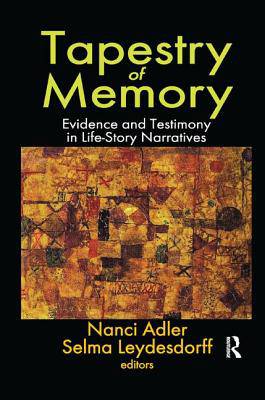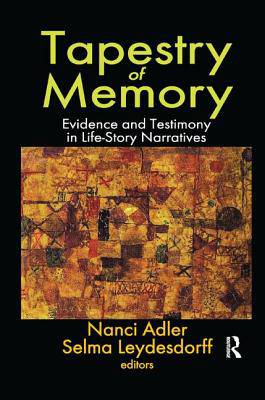
- Afhalen na 1 uur in een winkel met voorraad
- Gratis thuislevering in België vanaf € 30
- Ruim aanbod met 7 miljoen producten
- Afhalen na 1 uur in een winkel met voorraad
- Gratis thuislevering in België vanaf € 30
- Ruim aanbod met 7 miljoen producten
Tapestry of Memory
Evidence and Testimony in Life-Story Narratives
Omschrijving
In this volume, contributors present narratives and explore the way they influence the perception of the past. While acknowledging the debate about the validity of qualitative research based on narratives, this volume aims to illuminate how truth and evidence form part of a much wider debate on the representation of history.
The volume includes the work of historians but the interdisciplinary nature of the contributions shows that the validity debate also applies to the broader fields of cultural studies, sociology, and other social sciences. The distinction between memory and testimony is a crucial theme. Memory, though selective, is the basis of testimony. Testimony provides an audience with information that becomes evidence of what was seen or experienced. Such evidence can form the basis of legal truth.
Nanci Adler and Selma Leydesdorff divide the volume into three core sections: Official Testimony and Other "Facts and Evidence"; The Creation of New History and the Integration of Collective Memory in the Story of One's Self; and Claims Based on Narratives vs. Official History. After a comprehensive introduction by the editors, the volume offers twelve essays by leading scholars. This work is a new offering in Transaction's acclaimed Memory and Narrative series.
Specificaties
Betrokkenen
- Uitgeverij:
Inhoud
- Aantal bladzijden:
- 279
- Taal:
- Engels
- Reeks:
Eigenschappen
- Productcode (EAN):
- 9781138515215
- Verschijningsdatum:
- 28/09/2017
- Uitvoering:
- Paperback
- Formaat:
- Trade paperback (VS)
- Afmetingen:
- 152 mm x 229 mm
- Gewicht:
- 452 g

Alleen bij Standaard Boekhandel
Beoordelingen
We publiceren alleen reviews die voldoen aan de voorwaarden voor reviews. Bekijk onze voorwaarden voor reviews.










